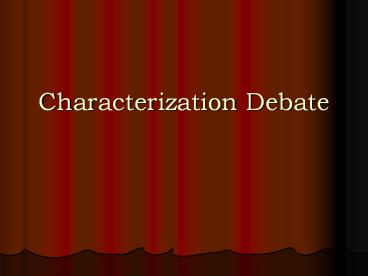Characterization Debate - PowerPoint PPT Presentation
1 / 15
Title: Characterization Debate
1
Characterization Debate
2
Split into Teams
- Rules
- Move calmly and quietly to your designated area
- Respect your neighbors!
3
So, whats going on?
- I need four people to volunteer, split into two
teams and stand in two lines facing eachother. - Try to speak to each other for thirty seconds
asking ONLY questions, if you say anything thats
not a question you must go to the back of the
line. - Ponder what it would be like if you went through
life questioning everything but acting on
nothing.
4
Objectives for the day
- Define Characterization
- Analyze how an author uses characterization in a
play.
5
Resolution
- In life, it is better to go with the flow.
6
Rosencrantz and Guildenstern are Dead By Tom
Stoppard
- Today we will be reading an excerpt from the
Rosencrantz and Guildenstern are Dead. - The play, a spin off of William Shakespeares
great play Hamlet, follows Hamlets two best
friends, R G, as they haphazardly and
confusedly travel through life.
7
Debate FormatIn life, it is better to go with
the flow.
- Affirmative
- 1. Speak first
- (60 seconds)
- 2. Speak first
- (60 seconds)
- Prep. Time for summary (60 seconds)
- Summary Speak second
- (60 seconds)
- Negative
- 1. Speak second
- (60 seconds)
- 2. Speak second
- (60 seconds)
- Prep. Time for summary (60 seconds)
- Summary Speak first
- (60 seconds)
8
Debate RubricIn life, it is better to go with
the flow.
Unsatisfactory Satisfactory Excellent
Debate Points Arguments not developed, does not answer attacks, uses no sources or uses sources incorrectly. Well-developed arguments, answers most attacks, uses some sources to back up opinions or uses sources partially incorrectly. Well-developed arguments, answers all attacks, uses sources correctly to back up opinions
Participation Does not speak at all to team, does not fill out worksheet at all. Does not speak very much to team, does not fill out worksheet fully. Speaks ideas to team, either speaks during debate or follows debate fully by filling out the worksheet.
Behavior Follows none of the behavior guidelines on the following slide and/or is disruptive to learning. Follows most behavior guidelines on the following slide. Follows all behavior guidelines on following slide.
9
Behavioral Expectations for DebateIn life, it
is better to go with the flow.
- For prep. time
- Keep voices low enough so only those at your
table can hear you. - Respect everyones ideas
- Write down your debate points on the worksheet as
well as the counter-points you think the opposing
team may say during the debate. - You will be given 5 minutes to prepare.
- During the debate
- One person may speak at a time.
- Address everyone as My Friend or My Respected
Colleague. - Each speaker will get 60 seconds to deliver their
points. - Before the summary round, you will be allotted 60
seconds to prepare closing arguments.
10
Debate FormatIn life, it is better to go with
the flow.
- Affirmative
- 1. Speak first
- (60 seconds)
- 2. Speak first
- (60 seconds)
- Prep. Time for summary (60 seconds)
- Summary Speak second
- (60 seconds)
- Negative
- 1. Speak second
- (60 seconds)
- 2. Speak second
- (60 seconds)
- Prep. Time for summary (60 seconds)
- Summary Speak first
- (60 seconds)
11
Issues raised
- What have we learned so far?
- From the debate points?
- From the text?
- From the handout?
12
How did the debate go?
- What do you think the best point the opposing
team made was? - Was there a point that you thought they would say
but didnt? - Who was the debate MVP?
- What could we do to make the next debate better?
13
Reviewing objectives
- Define the following terms Characterization,
Static/Dynamic Character, Antagonist/Protagonist. - Analyze how an author uses characterization in a
play. - Analyze how motifs and symbols add to the overall
meaning of a play.
14
HOMEWORK!
- For the next class, I would like you all to
research existentialism on the internet using
www.allaboutphilosophy.org. Afterwards, read the
full first act of Stoppards Rosencrantz and
Guildenstern are Dead. Find three excerpts in the
text that relate to the existential philosophy
and write a short but fully developed paragraph
analyzing why the passages are existential and
how the excerpts characterize the main
characters. - Tomorrow we will discuss how this philosophy is
an important theme in the play and how it
characterizes Rosencrantz and Guildenstern. So be
ready to share your findings with the class!
15
Materials used
- "Existentialism." Philosophy - AllAboutPhilosophy.
org. Web. 16 Sept. 2009. lthttp//www.allaboutphilo
sophy.org/existentialism.htmgt. - Harmon, William. Handbook to literature. Upper
Saddle River, N.J Pearson/Prentice Hall, 2006.
Print. - "SparkNotes Rosencrantz and Guildenstern Are
Dead Themes, Motifs Symbols." SparkNotes
Today's Most Popular Study Guides. Web. 15 Sept.
2009. lthttp//www.sparknotes.com/lit/rosencrantz/
the mes.htmlgt. - Web. 16 Sept. 2009. lthttp//lib.ru/PXESY/STOPPARD/
r_g_engl.txtgt.































